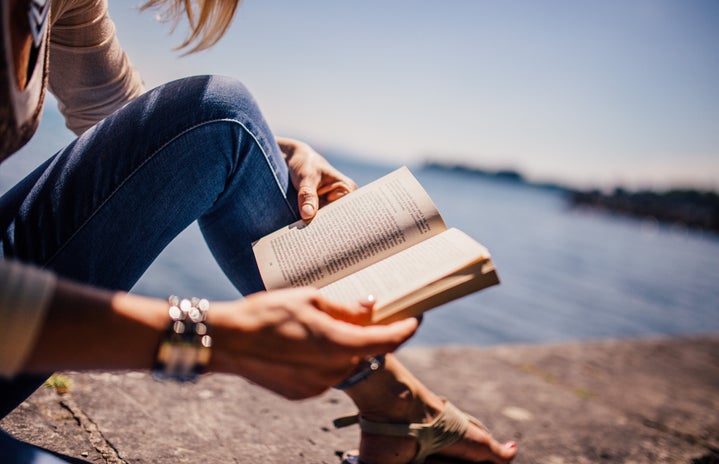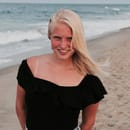As a double major in English and philosophy, I have spent a majority of my college career in the library with a book and a highlighter reading a dozen different novels and case studies and all sorts of different literature. As a senior, I know that I am graduating with a pretty hefty knowledge of novels that span across time and they’ve each touched me in a way that few writers have ever been able to put into words. Having first started college, I had no clue what I was going to do with my life, and I had no idea what major I would end up choosing. Luckily my freshman year English teacher told me that “it would be a tragedy” if I didn’t major in English. So, I declared my first major. Now that I’m graduating, I decided to compile a list of the books that I’ve read that not only influenced me, but specifically helped shape as a woman. Each of these books were assigned reading, and I seriously doubt I would have read half of them had they not been required, but I’m thrilled that they were because they all provided me with role models and lessons on sex and gender and myself that I know I’m going to carry with me for the rest of my life. I’ve included a review of the book along with a quote that I think kind of captures it.
“My Brilliant Friend” – Elena Ferrante
“My Brilliant Friend” is a coming of age story that was translated from the original Italian. Up until this novel I had read exclusively books that were originally written in English, and while that wasn’t intentional, I now realize what a severe omission that was. Elena Ferrante beautifully captures all the ups and downs of girlhood in a way that I have never seen replicated. It is part of a four-book series called the Neapolitan Novels that follows the tumultuous relationship of two women, capturing the ugliest side that can exist in deep friendship alongside the beautiful support that exists. The first book is centered on their childhood and the second book looks at the teenage years, then the third book looks at them as adults and the fourth is focused on their old age. The level of understanding and kinship that I felt with the characters was remarkable and while we were only required to read the first book in the series, I went out and bought the next four upon finishing the first one and I finished the series within the month. Elena Ferrante gave me an insight into myself and she helped me see who I was more clearly and more realistically. She views life through a very unforgiving lens and somehow that makes it all the more endearing.
“We were twelve years old, but we walked along the hot streets of the neighborhood, amid the dust and flies that the occasional old trucks stirred up as they passed, like two old ladies taking the measure of lives of disappointment, clinging tightly to each other. No one understood us, only we two—I thought—understood one another.”
“The Great Gatsby”- F. Scott Fitzgerald
Okay, so I’m sure almost everyone has read this one in high school, but it’s just not the same. In college, you understand more of just that idea of infatuation versus true love. No one likes Daisy in the Great Gatsby, and it’s for a fair reason. For those who don’t know, “The Great Gatsby” takes place in the Jazz Age where there was glitz and glamour that held a thin veil over top of the confusion and instability of the time. It’s about a man, named Gatsby, who falls in love with Daisy Buchanan and becomes rich and hosts these extravagant parties to try to win her heart. Daisy is a pretty one dimensional character and while there are other female characters that seem to have much more of a backbone like Jordan for instance. Nevertheless, Daisy has one line that captures the struggles that women of the time were bound to go through without really even referencing them. It’s a novel that makes you think about where we were and where we are now.
“I hope she’ll be a fool—that’s the best thing a girl can be in this world, a beautiful little fool.”
“Little Women”- Louisa May Alcott
This is another story that practically everyone knows. The first time I read this story I was in middle school, and I could easily appreciate Jo’s tomboy traits and the closeness that the sisters had. Last year it was a required reading for my 19th century U.S. literature class, and I fell in love on an entirely different level. The story follows the lives of four sisters who are all extremely different. Meg is the eldest and is very exceedingly elegant and while being independent in her own right, follows a far more traditional path but she plays the role of a strong homemaker therefore respecting the role of the housewife rather than seeing her as weak. Jo comes next and she takes the role of the heroine of the story and her rebellious character has been inspirational to readers through the years. Beth takes on the role as the sweet, complacent woman, representing a past image that is far weaker than our true character, yet there still exists a love and appreciation for her. Then comes Amy, the youngest and most imaginative. She’s extremely feminine but maintains the same spitfire qualities that exist in Jo. This novel is pivotal in the evolution of women in literature. The ambition these women possess, particularly Jo, is inspiring and I sat on the 4th floor of the library crying my eyes out over this particular book.
“I want to do something splendid…something heroic or wonderful that won’t be forgotten after I’m dead. I don’t know what, but I’m on the watch for it and mean to astonish you all someday.”
“Northanger Abbey”- Jane Austen
How can a list about women in literature exist without a novel by Jane Austen? So, my first Jane Austen novel was “Pride and Prejudice” and if you haven’t read that one then just exit out of this list now and go find a copy and read it because it is life changing! However, I did not read Pride and Prejudice as a college student, instead we read “Northanger Abbey” which centers on another one of Jane Austen’s heroines who is obsessed with novels and lives a bit in her own world. Throughout the somewhat gothic novel she slowly comes to terms with reality and reconciles her own imagination with the outside world. As an English major, it’s very easy to relate to a character who lives in a world of fiction. Catherine becomes a strong female character that you’re bound to fall in love with and her wit and her sarcastic humor along with her adventurous spirit have inspired me to use my own mind to pursue nobler pursuits than that of daydreaming. Her character is especially important in literature because she is respected and loved not for her beauty or her wealth but for her mind and character.
“If adventures will not befall a young lady in her own village, she must seek them abroad.”
“Paradise Lost”- John Milton
“Paradise Lost” was written by John Milton in order to explain the ways of God to man, however his depiction of Eve is ridiculously advanced for his time. Eve is depicted not only as pure and the epitome of innocence and beauty, but he also allows her to have a sexual feature in her character that opens up the idea that a woman’s sexuality is not something to be vilified. Milton’s version of the Fall of Man is one of the few to include a sex scene between Adam and Eve that occurs before the actual Fall. This shows that sex is not meant to be taboo. Eve takes on this really almost empowering persona that makes her almost stronger than her male counterpart, despite being made from him and for him. She holds the same mental capacities and even introduces the prospect of repentance which is supposed to save mankind. She has far more power than she is historically credited. Milton introduces the idea that sex and conversation create the epitome of human connection and it is a type of connection that not even angels can comprehend. This particular epic forced me to think about sex as a type of communication, it also presented the power that exists in childbirth and a woman’s ability to create life. I’ve never been a particularly religious person but Milton’s portrayal of Eve opened me up to the prospect that religion is not necessarily restricting but can instead be empowering in a way.
“he, she knew, would intermix grateful digressions, and solve high dispute with conjugal caresses; from his lip not words alone would please her. O when meet now such pairs, in love and mutual honor joined?”
“The Complete Works of William Shakespeare”- William Shakespeare
I will admit that I had read a lot of Shakespeare before college, but in my collegiate years I have had the opportunity to take three separate college courses that centered on Shakespeare and his plays. As a pretty big fan, it was pretty difficult to pick just one play that’s influenced me, so I decided to focus on the characters that I’ve grown to see as role models, such as Rosalind from “As You Like It” or Beatrice from “Much Ado About Nothing”. Rosalind is one of Shakespeare’s heroines that disguises herself as a man and her wit is brilliant and hard to be matched, although Beatrice comes pretty close. Alongside characters like Portia from “The Merchant of Venice” who disguises herself as a judge and then Lady Macbeth from “Macbeth” it’s practically impossible to view Shakespeare as anything but a man who admired intelligence in women as he so often had his leading ladies run the plot. Truly, I invite anyone to challenge me on this, Shakespeare was brilliant in his understanding of the human psyche and his portrayal of women was pivotal in the broader understanding of women as equal to men.
“Though she be but little, she is fierce.”



